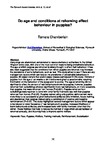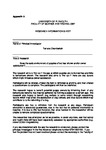Do age and conditions at rehoming affect behaviour in puppies?
| dc.contributor.author | Chamberlain, T. | |
| dc.date.accessioned | 2019-05-15T10:08:02Z | |
| dc.date.available | 2019-05-15T10:08:02Z | |
| dc.date.issued | 2012 | |
| dc.identifier.citation |
Chamberlain, T. (2012) 'Do age and conditions at rehoming affect behaviour in puppies?', The Plymouth Student Scientist, 5(1), p. 23-37. | en_US |
| dc.identifier.issn | 1754-2383 | |
| dc.identifier.uri | http://hdl.handle.net/10026.1/13964 | |
| dc.description.abstract |
Many dogs are abandoned, surrendered to rescue shelters or euthanised in the United Kingdom every year, with one of the most common reasons being undesirable behaviour. The age at which puppies are rehomed is widely thought to affect their behaviour. It has also been suggested that the conditions from which puppies are rehomed may increase the prevalence of some behaviours, such as fear. This study aimed to see if there are any management factors which can reduce the prevalence of undesirable behaviours in puppies. 65 puppy owners that attend puppy classes participated in this study. Owners of puppies from the age of ten weeks to six months were given a questionnaire, requiring information on the behaviour of the puppy and its source. The age at rehoming did not significantly affect the amount of fear behaviours shown by puppies, however, puppies rehomed from outbuildings showed significantly more fear behaviours, on more occasions, than puppies that were rehomed from homes (P<0.001). Puppies rehomed from outbuildings were reported to bond with other family members less well than puppies rehomed from homes (P<0.05). Puppies trained using only positive reinforcement were more likely to be successful at given behavioural attributes (bite inhibition, house training, and obedience) than puppies trained using a combination of positive and negative reinforcement (P<0.02). The study highlighted several management factors which appear to be related to lower frequency of fear behaviours in puppies, increased likelihood of learnt behavioural attributes, and increased bond with family members other than the owner. These findings may help to reduce the number of dogs which are euthanised or rehomed annually, and thus may help to improve canine welfare. | en_US |
| dc.language.iso | en | en_US |
| dc.publisher | University of Plymouth | |
| dc.rights | Attribution 3.0 United States | * |
| dc.rights.uri | http://creativecommons.org/licenses/by/3.0/us/ | * |
| dc.subject | fear | en_US |
| dc.subject | puppies | en_US |
| dc.subject | welfare | en_US |
| dc.subject | training methods | en_US |
| dc.subject | reinforcement | en_US |
| dc.subject | socialisation | en_US |
| dc.title | Do age and conditions at rehoming affect behaviour in puppies? | en_US |
| dc.type | Article | |
| plymouth.issue | 1 | |
| plymouth.volume | 5 | |
| plymouth.journal | The Plymouth Student Scientist |




